COMMUNITY
MCC alumna’s restaurant opens amid pandemic, sees success
page 10
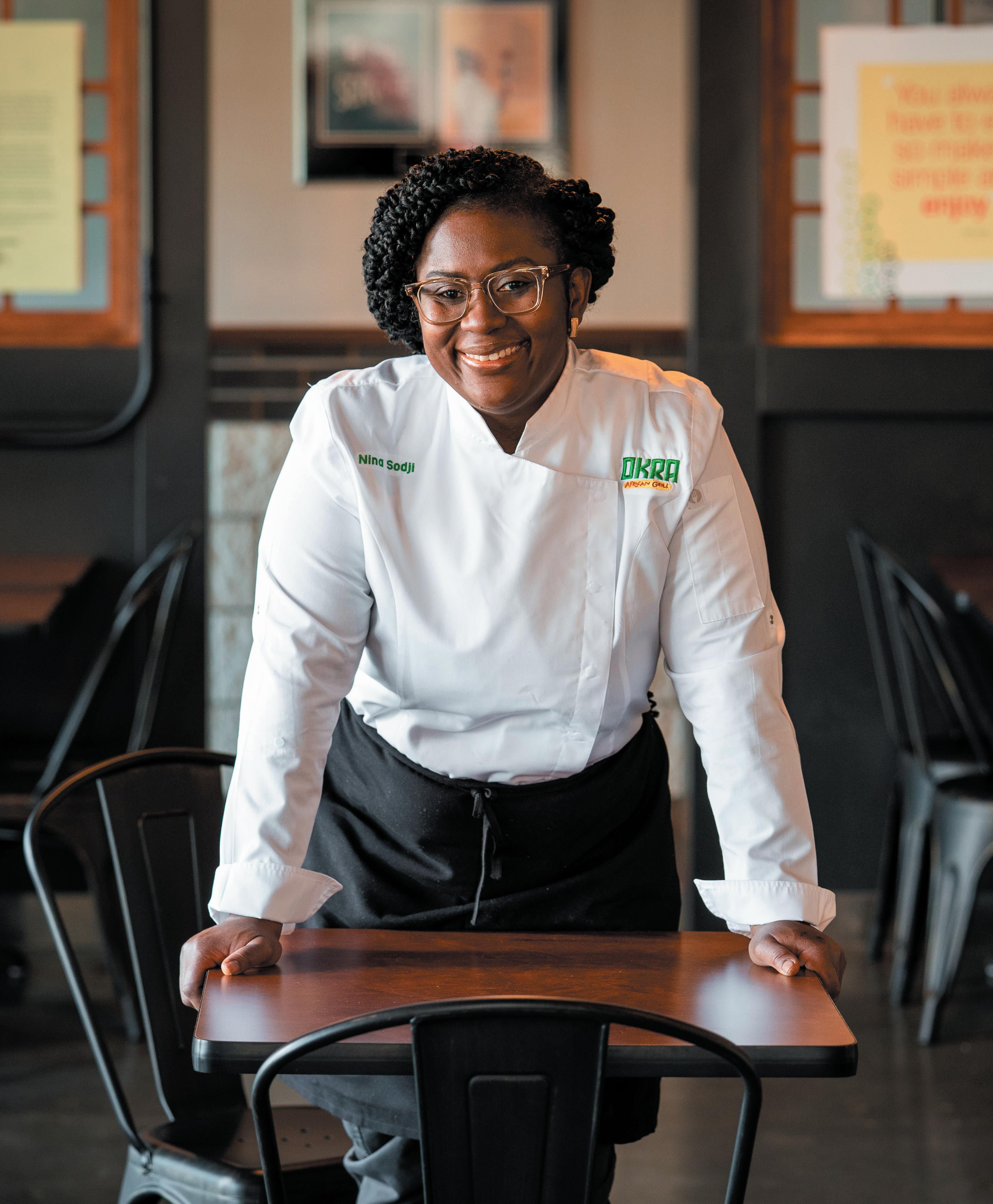
“I’m still here.”
Volume 9, Issue 2
THE MAGAZINE OF METROPOLITAN COMMUNITY COLLEGE
4
Care
Credits
Lead editor and contributor: Derek Rayment
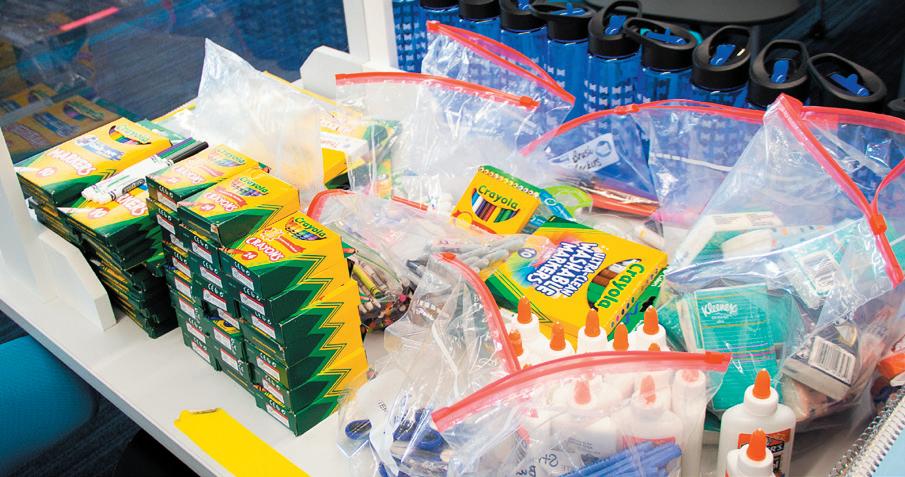
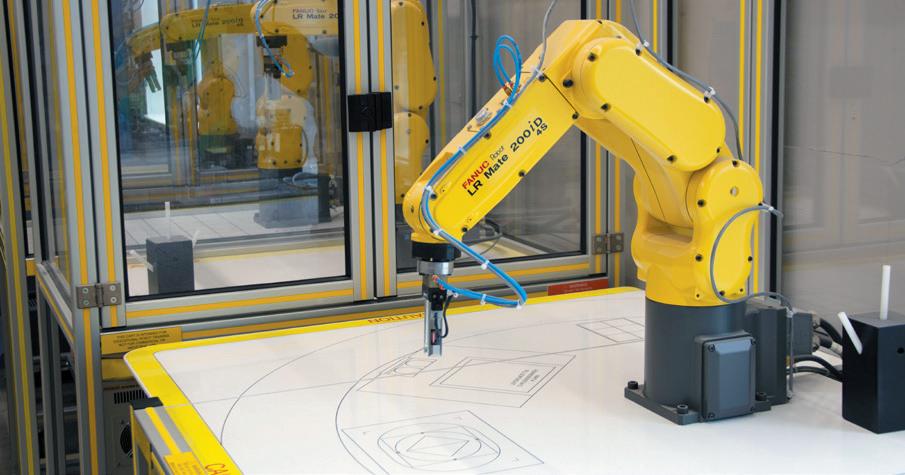
Assistant editors and contributors: Katherine Riggs and Jenny Milligan
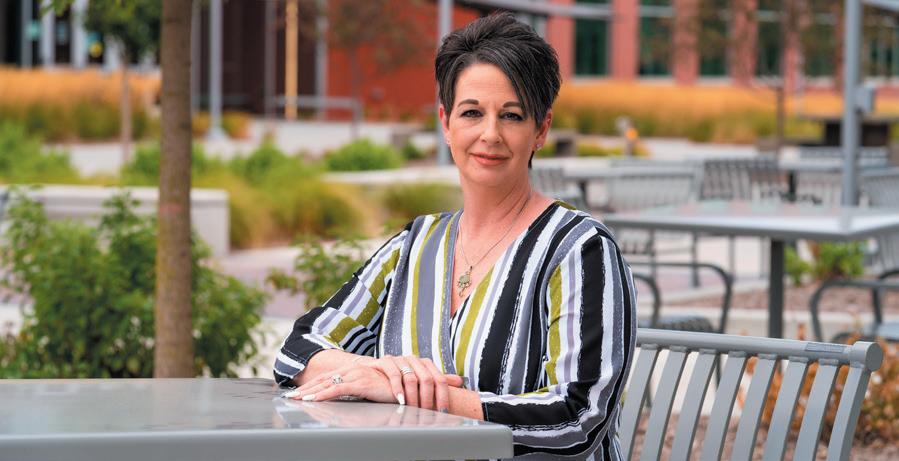
Lead art direction: Trevor Pikop
Art contributors: Jade Dyer and Susana Vanourney
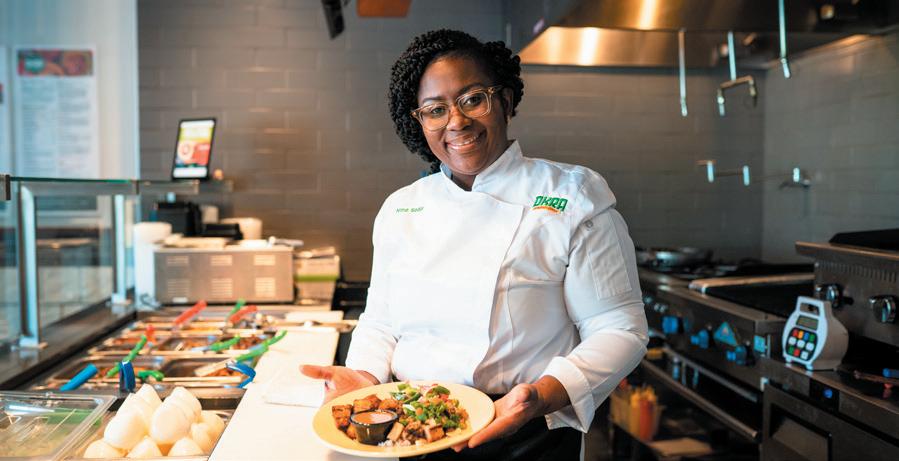
ii • community • mccneb.edu Contents 1 A letter from the MCC Foundation 2 Faces of MCC A snapshot of the College community 4 Keeping connected Do School helps local students continue learning 6 New course offerings train students in robotics 10 I’m still here MCC alumna’s restaurant opens amid pandemic, sees success 14 Key partnership leads to apprenticeships for student 16 Life is too short to not do what you love Care Corps’ LifeHouse CEO, 2020 Distinguished Alumni has passion for caring 20 Get to know Raquel Hendersen Recipient of the Change Maker Award from the Omaha Chamber 21 Nebraska Math Readiness Project sees success throughout the state 24 Around the College Volume 9, Issue 2 Community is a publication of Metropolitan Community College. Contact the editor at 531-MCC-2876 or darayment@mccneb.edu. Metropolitan Community College affirms a policy of equal education, employment opportunities and nondiscrimination in providing services to the public. To read our full policy statement, visit mccneb.edu/nondiscrimination.
New course offerings train Students in robotics
corps’ Lifehouse CEO, 2020 distinguished almuni has a passion for caring
I’m still here: MCC alumna’s restaurant opens amid pandemic, sees success
6 16 10
Keeping connected: Do School helps local Students continue learning
a Letter from the MCC Foundation

Dear friends and supporters,
With spring here and summer fast approaching, I can’t remember being more thrilled about a change of season. After a year of disruption, I am ready to celebrate the familiar rituals we enjoy at this time of year–graduation and honoring the people and programs making a meaningful difference in our community.
In this issue of Community, we introduce you to the 2020 MCC Distinguished Alumni Award recipient, Tera Kucera, whose commitment to expanding community services in Fremont led to her role as CEO of Care Corps’ LifeHouse. We celebrate Racquel Henderson, an MCC college success navigator honored by the Greater Omaha Chamber as one of four 2021 Change Makers. You will also learn about Todd Hanson, executive director of Student Services in Fremont, who was awarded the Diane Donelson Spirit Award by the MCC Board of Governors for demonstrating leadership and relationship building. In addition to their commitment to MCC, each of these community leaders provides hope and supports others in achieving their full potential.

You will also learn about the MCC Continuing Education teams efforts to provide a safe space for elementary students to participate in remote learning activities. And, we’ll introduce you to our alumna, Nina Sodji, the owner of Okra African Grill, a local restaurant that opened in March 2020, despite the in-person dining limitations. Our MCC community perseveres and demonstrates the capacity to achieve their goals, even when faced with adversity.
We have a lot to celebrate at MCC, and we hope you enjoy learning more in this issue. Thank you for being an important part of our community. We celebrate you.
Sincerely,
 Amy Recker Executive director, MCC Foundation
Amy Recker Executive director, MCC Foundation
community • mccneb.edu • 1
FACES OF A Snapshot of the College
The diversity of those making up the student, staff and faculty at Metropolitan Community College is what shapes and contributes to our community of educators and learners. A snapshot of these individuals is captured in the Faces of MCC photo series published to the College’s Facebook page each week. Here are a few of the students, alumni, faculty and staff who make up the MCC community.
MICHELLE B. - INTERIOR DESIGN STUDENT


“As a creative person, I am constantly inspired by everything and everyone around me. It’s easy to be inspired by the work ethic of my family, creativity of my coworkers, volunteerism of friends, knowledge of my mentors, perseverance of my classmates and teachers, and the bravery of all of our first responders and healthcare workers. The hard part is taking those pieces of inspiration and using them in a positive way to make a difference and become the best person you can be.”
NANCI M. - RESPIRATORY THERAPY STUDENT
“My parents are my biggest inspiration. They are both from Michoacán, Mexico. They didn’t have the opportunity of an education like the one I have. With no education and not knowing any English, they managed to give me the opportunity of ‘the American dream.’ I couldn’t be more thankful and proud of my parents for their hard work and accomplishments in this country. They’ve taught me hard work and dedication. I am who I am today thanks to my parents, who have shown me their good ways and push me to be the best I can be. As a first-generation college student, I have faced many challenges and I couldn’t have gone through those obstacles without their unconditional love and support.”
2 • community • mccneb.edu
MCC College Community
HANS R. - MCC ACADEMIC ADVISOR

“I grew up wanting to be a radio disc jockey. I used to listen to the radio all the time and record songs on cassette tapes and combine them to try to make my own radio show. One of my first real jobs was working at a department store. They played recorded music throughout the store. I asked for permission to remix the tapes so that I could give announcements in between the songs. Every once in a while, I’d be working at the department store and would hear myself giving some kind of announcement thanking the shopper for shopping at the store and it was really neat. I had a blast and minored in that in college.”
MIKE G. - MCC DIGITAL CONTENT SPECIALIST
“It was a long process and a huge risk, but I quit my job to live and work in South Korea for a year, where I met my partner (a fellow English teacher from Canada) whom I now live with in Toronto. Making that leap led me to my current position at MCC, which started as a part-time temporary role upon my return to the U.S. and has blossomed into a full-time position where I learn something new every day.”

community • mccneb.edu • 3
Do School helps local students continue learning
There have been countless changes over the past year. The COVID-19 pandemic has caused nearly every business, education institution and person to make big changes in daily life.

In Omaha, K-12 schools chose to switch to all-virtual learning in spring 2020, meaning students needed technology, internet and parental supervision. For some families, it was difficult to obtain all three. Metropolitan Community College executive director of Continuing Education, Gary Girard, was hearing from

principals at local elementary schools that were facing obstacles.
“As the pandemic was growing and as students started to transition to remote learning, we began to notice challenges that a lot of our partners were experiencing with elementary-age kids,” Girard explains. “They were having a variety of issues related to connectivity. Parents were having issues with work and now staying home with their kids. Many didn’t have that flexibility. Not everybody has digital access.”
4 • community • mccneb.edu
Girard and others at the College wanted to be of service. They saw an opportunity to use MCC at Do Space after the principal at Brookside Elementary School, Tyler Hotovy, asked for help. Girard and Hotovy worked together, creating a safe model for students to come into and be able to learn in a helpful environment. They called it Do School.
In the fall 2020 semester, Do School opened for small groups of students from Brookside Elementary, Howard Kennedy Elementary and King Science and Technology Center. Girard says the families were able to see Do School beforehand and decide if it was a good fit.
“The principals, counselors and social workers told us which students would benefit the most from this learning hub. The principals worked with the families and that is how we got the students,” Girard says. “We had what we called an ‘open house’ for parents to see the facilities. We would go through the safety protocols and activities we would offer.”
On an average day, students would come in, drop their things in a designated bin, sit at their own desk (complete with plexiglass), log into their virtual class and work through the morning. Girard says MCC facilitators were always nearby to help with any technological problems, and staff and principals from the respective schools would stop in to see how students were doing and say hello.
After a lunch break, students spent the afternoon doing various activities that were fun, but also educational. Girard says there was something for each child to participate in.
“We just pivoted and offered College for Kids and College for Teens activities,” he says. “They could choose individual activities and work. There were also bigger things like building a robot or drone. They would learn with four or five kids socially distanced. Some activities might take a few weeks and some would take a few hours.”
With health and safety at the forefront of everyone’s mind, Girard says there were many precautions taken to ensure students, as well as parents, felt comfortable and safe.
“Every student had their own bin where no one touched anything in it except for them,” Girard says. “Every single activity we offered went through a safety protocol. It was all sanitized and put into a Ziploc bag. When students left to go anywhere, we had a safety coordinator who would sanitize their work station.”

As health and safety guidelines kept changing, so did school operations. Girard says Do School adapted to the changes. They went from seeing many children every day to a few days a week. Now, with schools back to in-person learning, Do School is much quieter. But, Girard says, they aren’t planning on stopping, but instead evolving to help students stay on track.
“We are still staying in touch with the principals. The Do School day school may transition to after-school and weekend programming. We can offer that programming that can help fill those gaps,” he says.
And that may be something parents and students want.
“The feedback from parents and principals was positive. They could really see the academic and social impact. There was a mindfulness piece to all of this. How can we live safely through this pandemic without living in fear as a child? It was amazing to see it evolve.”
community • mccneb.edu • 5
There was a mindfulness piece to all of this. How can we live safely through this pandemic without living in fear as a child? It was amazing to see it evolve.
New course offerings train students in robotics
The workforce is everchanging. Many industries are moving toward robotics on their manufacturing lines.

But with new technology comes new problems. This means industries need reliable technicians and engineers to keep the automation systems working. Businesses are always looking for highly skilled employees with valuable skills that will help grow their business.
At Metropolitan Community College, programs are also changing to help keep students ahead of the curve with valuable skills.
Introduction to Robotics kicked off at MCC during the 2020 winter quarter. The class was added to the curriculum after noticing an increase in robotics in the industry, says associate dean of Industrial and Automotive Technology Scott Broady.
“Across the manufacturing industry in the four-county area, there has been in increasing number of companies that have added robotics to their automated manufacturing process,” Broady says. “These courses were developed and are part of the Electrical Mechanical Technology degree path to give students exposure to robotics.”
Broady says the courses are very hands-on and teaches students all different aspects of working with manufacturing
robotics, including setup, operation, troubleshooting and programming. The class is held in the new Center for Advanced Manufacturing on the South Omaha Campus and is a major requirement for the Electrical Mechanical Technology certificate program. The lab is outfitted with all the equipment needed for students to master their skills.
“MCC has invested in FANUC robotic training arms. We have six in our electrical-mechanical lab,” Broady explains. “This is a very lab-intensive program.”
Led by instructors with experience in the field, students learn to successfully program, test, run and troubleshoot automation application programs, demonstrate robotic movement, execute basic robotic functions and operations, and more. They also learn basic health and safety guidelines for being around heavy machinery.
Outside of lab work, students are expected to complete some online curriculum work, a hybrid model that offers students textbook and lab time.
Following the introductory courses, students can continue on to Vision for Industrial Robotics. In this second course, the curriculum builds on what is learned helping students build their credits toward a degree and learn the skills needed to become an expert in the field.
6 • community • mccneb.edu

community • mccneb.edu • 7
Students also have the option to become certified with FANUC America, a leading international supplier in robotics and factory automation. These third-party certifications show that students have an understanding of the FANUC robotics and Roboguide software. These certifications can focus on different areas of automation technology and are ideal for those just entering the electrical mechanical technology field because of their versatility.
If students enjoy working with different automation systems, critical thinking and problem-solving, this may be the career for them, Broady says. There will be jobs available for graduates, too, since the demand for workers with these skills continues to rise.
According to the U.S. Bureau of Labor Statistics, electro-mechanical technician jobs are expected to grow by three percent by 2029 and can have a median salary of $58,350. Technicians will work closely with electrical and mechanical engineers and have the option to work in many different industries, including aerospace, energy, plastics, computer and communications equipment, manufacturing and more.
Students graduating from the MCC Electrical Mechanical Technology program can do so with short-term career certificates in Beginning Industrial Sales Representative, Advanced Industrial Sales Representative, Building Maintenance or Logistics.
Students can obtain entry-level jobs as mechanics, installers and repair representatives on assembly lines. They will be responsible for keeping automation and robotic equipment in top shape by regularly inspecting, troubleshooting, repairing, reading schematics and operating.

“We have a tremendous need in the electrical mechanical area,” he says. “There are maintenance technicians and robotic technicians in operating environments. That is one of the biggest needs.”
Broady says he wants students a step ahead so they can work for the College’s industry partners.
“The next step for all our industry partners is automation smart manufacturing, which is producing goods in a leaner, better way. That is what they’re being faced with and that is what we’re preparing our students for. We want to train our future workforce,” he says.
To learn more about the industrial and commercial trades at MCC, including the Electrical Mechanical Technology program, visit mccneb.edu/industrial or email cam@mccneb.edu.
8 • community • mccneb.edu


community • mccneb.edu • 9
“
We want to train our future workforce.”
Scott Broady
ASSOCIATE DEAN OF INDUSTRIAL AND AUTOMOTIVE TECHNOLOGY
MCC alumna’s restaurant opens amid pandemic, sees success
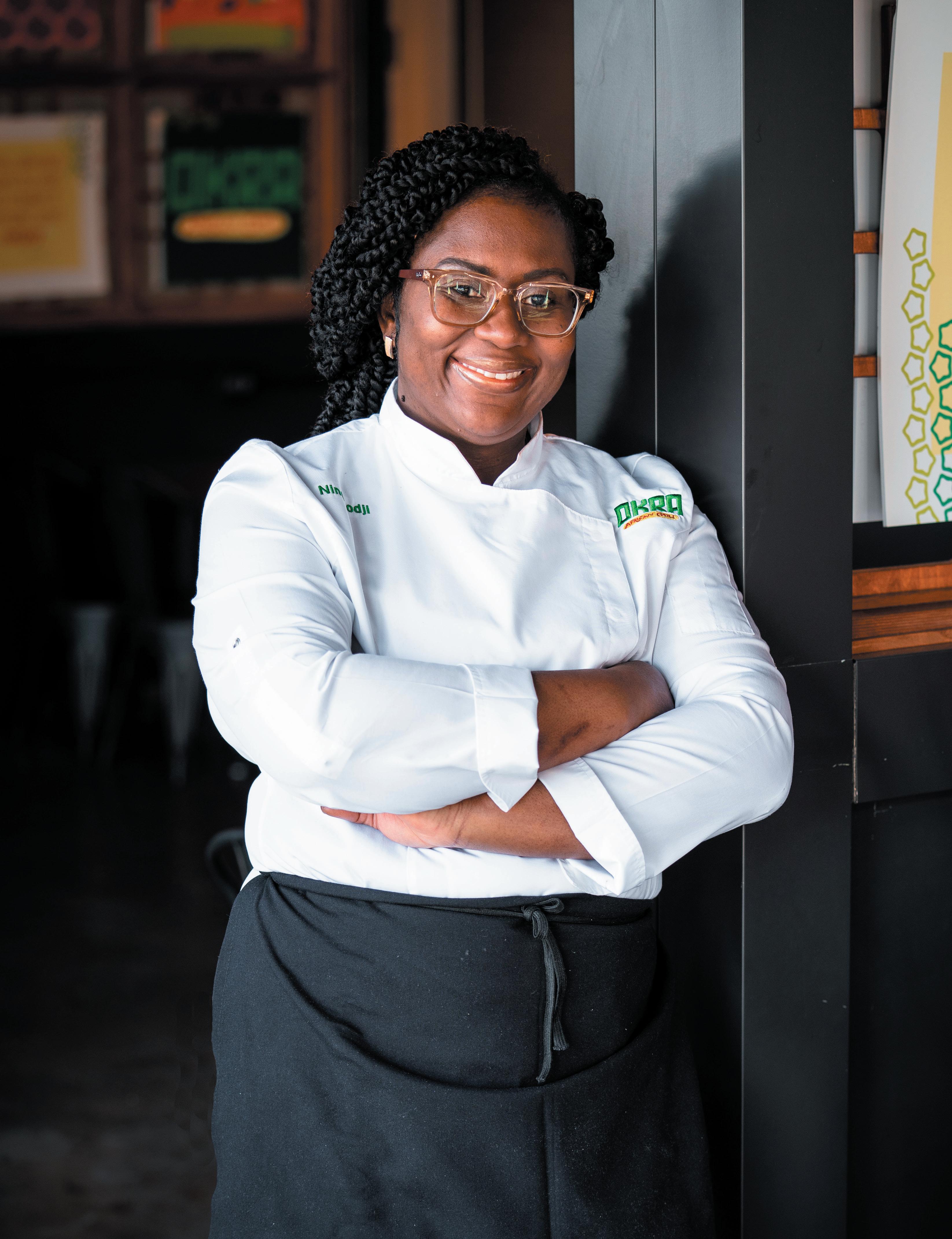
10 • community • mccneb.edu
“I’m still here.”
The past year has put us all to the test. Most of us have adapted and changed our personal lives, businesses, education and everything in between. But for Nina Sodji, the one constant has always been change. In fact, she has constantly adapted since she arrived in the United States from Togo in the 1990s.
“In 1990, there was a civil war in Togo that started to make people think about leaving the country. It became a warzone,” Sodji explains.
While in Togo, Sodji and her sister were noticing that her newborn nephew was having health complications. Searching for answers, Sodji and her family moved to Omaha when they were told about Nebraska Medicine. Seeing her family’s medical journey inspired her to go to nursing school at the University of Nebraska Medical Center.
“I wanted to know more about the healthcare system so, I could go back and teach people [in Togo],” she says.
Sodji initially pursued a career in nursing. While she liked it, she always had a strong passion for the culinary arts. When she and her sister moved to Omaha, they had a hard time finding the right ingredients for African cuisine. It became a hunt for many ingredients.
“When we came here, there was no African food or anywhere to just go and find what we needed to cook what we prepared back home,” she explains. “We would go around and search for plantains. We would buy five different kinds of sardines and test them all to see what was the best.”
Sodji noticed a growing population of people from Togo in Omaha. She saw an opportunity to help others.
“They didn’t know where to go either. I thought ‘why don’t I open a market so they have a place to come and be and shop’,” she says. “There were a lot of bachelors who started coming in, too. Boys back home don’t cook, so I found another niche. I would cook the meals and sell them, too.”
Sodji opened her store, Tresdoux (“very delicious” in French) near 72nd and Pacific streets. Making the jump from nursing to opening a business may sound daunting, but Sodji says prayer and drive helped her.
“My mom had a fairly big business back home,” she says. “I had the background, so I walked into it. I had to step away from nursing to focus on the cooking because there was so much momentum.”
The store was successful, Sodji explains. But after her lease ended in that space, she needed to expand and moved the business to a space near 84th and Harrison streets. The new location didn’t flourish as much as the previous one.
“Ten years ago, I don’t think that should have been the spot I went to, but I did,” Sodji says. “I couldn’t make it work and I filed for bankruptcy.”
After Tresdoux closed, Sodji says she sat at home “sulking.” But a friend of hers had a suggestion that she continue to follow her passion and help it grow.
“She said ‘You know how to cook. You know what you want to do. Why don’t you go to culinary school?’ So I thought about it and said ‘why not?’” Sodji explains with a laugh.
Sodji enrolled at Metropolitan Community College in the Culinary Arts program in 2012. She says the small class size helped her form a special bond with her classmates.
“We were like a family. We’re still like a family,” she says. “The culinary world has a lot of arms and legs as I call it. There is this atmosphere of people with a diverse background, but it is small enough that you know your teachers and deans by their first name. We visited a graduate that worked in Chicago when we went there for a convention. We all went to his restaurant to support him. Where else do you find that? You don’t.”
Sodji loved MCC so much that she continued there after she graduated in 2014 as an instructor for noncredit courses and was working toward becoming an adjunct instructor. Adjunct instructors must have a bachelor’s degree though, so Sodji enrolled at Bellevue University. She graduated with a bachelor’s in Business Management in 2019.
Having an eye for the culinary arts and the food scene, Sodji noticed a lack of authentic African food in area restaurants.
Sodji thought about how to bring African food to the masses. She wanted people to see the diversity within African cuisine in an approachable way.
“That drive started pumping again,” she says. “I put my business hat back on. I had to try again.”
community • mccneb.edu • 11
Sodji began forming a business plan, getting licensing going and thinking of the perfect name for her restaurant. She was originally thinking of Nina’s Kitchen, but her teenage son didn’t love it.

“I told him Nina’s Kitchen and he said ‘Oh mom. You need something catchy that people will remember,’” she says.
Her son walked around the kitchen saying words that could be potential names.
“He opened the freezer and saw a bag of okra. He yelled ‘Mom! I got it! Okra!” Sodji says. “It rolls off the tongue.”
Sodji initially brushed it off, but the name stuck. Okra African Grill opened in March 2020 at 1303 S. 72nd St., #101.

Cuisine at the restaurant is a “reflection of Africa” Sodji says. There is a mix of different cultures represented such as Morocco, South Africa, Ghana, Nigeria and others. There are also influences from Europe and Asia infused. The menu is approachable, she says, so people won’t be too nervous to try too many unfamiliar things.
“People are surprised it’s so mainstream. I don’t want to put anything out that there that people don’t know because this is a way to welcome people into the culture, not shut them out,” Sodji says. “You have to start slow. When I started, it was very authentic. But with Okra, I wanted to be more mainstream.”
The opening was a success, with hundreds of people showing up to support and try the cuisine. But with the threat of COVID-19, restaurants saw restrictions move in swiftly.
“March 14 was a Saturday with our grand opening. By Monday, we went from almost 500 people to 50 people. That Tuesday, we had 10 people. By the next week we had no people,” Sodji says.
Dining rooms were closed, but Sodji knew Okra could still operate. With a “build your own meal” assembly line style, guests can come up to a counter (with glass separating them), see what they want, build a meal and easily take it to go.
“It kept us open,” she says. “If it was a reservation, sit-down place, we would not be here.”
A feature on a local TV news channel’s “Takeout Tuesday” segment helped boost business as well, Sodji says, helping go from a handful of customers a day to having a line and people asking how they can help.
The past year has showed Sodji that adaptability, flexibility and perseverance have been the key to her success. In a year with a new business, a pandemic, sick relatives and “everything that could go wrong,” she is still standing.
“It really has challenged me to my core,” she says. “But I’m still here. There are days that I don’t see the end of the tunnel. But God has been good.”
12 • community • mccneb.edu

community • mccneb.edu • 13
VISIT OKRAAFRICANGRILL.COM TO LEARN MORE ABOUT SODJI, THE RESTAURANT AND VIEW THE MENU.
“It really has challenged me to my core ... But I’m still here. There are days that I don’t see the end of the tunnel. But God has been good.”
KEY PARTNERSHIP LEADS TO APPRENTICESHIPS FOR STUDENTS

Smithfield Foods and Metropolitan Community College have partnered to provide a comprehensive apprenticeship program, offering student apprentices an opportunity at a high-demand job while earning college credit that can be used toward a certificate or degree. Ten Smithfield apprentices signed agreements earlier this spring, marking the beginning of their participation in the four-year program which provides three years of classroom learning through the MCC Electrical Mechanical Maintenance program and an additional year of hands-on experience with technicians at Smithfield’s facilities in Nebraska and Iowa.
Apprentices who complete the program receive a journeyman’s license, a federal U.S. Department of Labor certificate and college credit toward a degree. Apprentices are also eligible for salary and benefits as they progress to full-time employees. The 10 apprentices are the second cohort of students that have started the program, following the inaugural group in 2020.

“The partnership with Smithfield Foods has been beneficial for both students and workforce development,” says Scott Broady, associate dean of Industrial and Automotive Technology. “Having industry partners like Smithfield creates opportunities for people to earn good paying jobs on a path to a successful career, all while earning college credit.
We hope that these students use their college credit to go on to earn degrees or certificates, continuing their lifelong education.”
The students enrolled in the program will be taking advantage of the new Center for Advanced Manufacturing, a project that was completed at the end of 2020 on the South Omaha Campus.
“Smithfield is proud to continue this partnership with MCC to support and develop the next generation to enter the engineering and maintenance trades,” says Schwanzetta Williams, vice president of talent acquisition and diversity and inclusion for Smithfield Foods. “We’re excited to welcome our 10 new apprentices in their careers at Smithfield and pleased to provide them with this rewarding career path.”
While the COVID-19 pandemic gave the new apprenticeship program a speed bump for 2020, Broady says the first cohort of students has stuck together.
“Our first cohort of students that began this partnership had a real curveball thrown at them when the pandemic hit in spring 2020,” says Broady. “But they were very resilient and with the help of experienced instructors and staff, they are still on the pathway towards their degree. That speaks to the lasting endurance of this partnership with Smithfield.”
For more information on the Electrical Mechanical Maintenance Technology program, visit mccneb.edu/emmt.
14 • community • mccneb.edu

community • mccneb.edu • 15 FAN organizes and connects MCC alumni through academic, career and community activities. Get connected to share personal and professional milestones. Whether you are a new graduate or seasoned professional, we want to hear from you and continue sharing all the ways you can build lasting connections by being a FAN. Visit mccneb.edu/fan/keepintouch or contact FANS@mccneb.edu or at 531-MCC-2747. Congratulations 2021 MCC graduates! Welcome to our Friends and Alumni Network (FAN).
‘Life is too
‘Life
is
short to not do what you love’
too short to not do what you love’
Care Corps’ LifeHouse CEO, 2020 MCC Distinguished Alumni has passion for caring

16 • community • mccneb.edu
One conversation can change everything.
Tera Kucera was often sitting and talking with her mother in 2013, who had stage-four lung cancer. Kucera says during that year, before her mother died in December, they spoke about many different subjects, including how to live life to the fullest.
“During that year, my mother and I had some very precious and intimate conversations about life, death and everything in between,” she says. “My mom told me to find my passion—my reason for being. When my journey comes to an end, what advice would I give to my own children? My answer and her answer were the same, ‘life is too short to not do what you love.’”
A lightbulb went on for Kucera. She had worked in retail for more than two decades and owned a small interior design business. But she decided to take her own advice and go in a different direction, although she wasn’t sure exactly how just yet.

“I knew in that moment that my passion was to make a difference in the lives of others,” she says. “I wasn’t sure what that would, or should look like. I just knew that what I was doing wasn’t filling my bucket, nor was it something I was passionate about.”
Kucera decided to enroll at Metropolitan Community College. Along with her, Kucera’s two daughters, Taylor and Tyler, enrolled, too. Kucera says going to school with her daughters at a college she loved was a great experience.
“Neither of them knew what they wanted to do when they grew up either,” she says with a laugh. “I say that teasingly and with much love, but also from a place where it’s OK to not know. And it’s never too late to start.”
Kucera majored in Liberal Arts, often having classes with her daughters. They would work together in study groups and discuss what happened in class. Kucera was also involved in the Student Advisory Council, study abroad on the Rosebud Reservation and was inducted into the Phi Theta Kappa Honor Society. She graduated from MCC in 2016.
While studying at MCC, Kucera learned about Americorps, a national volunteer program. Through this program, she started volunteering with Care Corps in Fremont, Nebraska.
community • mccneb.edu • 17
Care Corps (now named Care Corps’ LifeHouse Mission) is a 24-hour emergency shelter that provides food, a bed, hygiene products, clothing and other resources for individuals and families at or below the poverty line.
“While meeting these basic needs, we are working to empower individuals and families through their continuum of care,” Kucera explains. “During a person’s stay, case managers work closely with the individual and families, investing in their future through intensive care management, applying for benefits, assisting with sustainable income, budgeting and other life skills.”
Kucera was hired on as a case worker in 2015 and was soon asked to serve as an interim executive director. The move up the ladder was tough at first, she says, but she got to work quickly.
“It was difficult at first. I went from being the new hire to the new boss in a two-week period,” Kucera says. “With growth comes change. I was asked to evaluate the organization, its program, staffing, funding sources and the impact the organization was making in the lives of those it served. I saw opportunities to improve in many areas and began implementing a strategic plan.”
Under Kucera’s new leadership, Care Corps started to thrive. But with that newfound success came a creeping feeling inside Kucera. She was worried she wasn’t fulfilling her passion by directly helping those in need.
“I said to my husband that I thought I had wandered off my path,” she says. “He looked at me and said ‘your gifts and talents are in visions, strategies and solutions, not in providing direct services.’ He was right. I haven’t had a second thought about fulfilling my passion since.”
Within that first year, Kucera was able to make big changes within Care Corps. The organization was able to bring on a Rapid Re-Housing program, geared toward moving individuals and families out of homelessness and into housing as quickly as possible. Soon after, Kucera accepted the executive director position full-time.
In 2018, Kucera, who has since been named CEO of the organization, played an integral role in bringing together Care Corps Family Services and Low-Income Ministry, forming a strategic partnership that operates under one organization, Care Corps’ LifeHouse.
In 2019, Care Corps’ LifeHouse was awarded $2.8 million dollars to build, own and operate 15 low-income housing units for families in Fremont. These units, consisting of 10 two-bedroom, and five three-bedrooms, will provide more

than just housing to families. They will provide a holistic approach with access to services such as mental health and healthcare, parenting classes, budgeting, life skills classes and more with wraparound case management.
Kucera has been able to expand, grow and create multiple programs within Care Corps’ LifeHouse. This includes a food pantry, thrift store, voucher program and emergency shelter.
Kucera says there is no average day as the CEO. In the past few years especially, her duties have changed due to the historic floods of 2019 and the COVID-19 pandemic through 2020.
“A lot of my time is now spent assisting the community in navigating local, state and federal resources to provide rental, mortgage, utility and food security without starting new programs,” she says.
18 • community • mccneb.edu
I KNEW IN THAT MOMENT THAT MY PASSION WAS TO MAKE A DIFFERENCE IN THE LIVES OF OTHERS... I WASN’T SURE WHAT THAT WOULD, OR SHOULD LOOK LIKE. I JUST KNEW THAT WHAT I WAS DOING WASN’T FILLING MY BUCKET...
In 2020, Kucera was chosen for the MCC Distinguished Alumni Award. This award is given to a graduate who the College’s award committee thinks has had outstanding achievements and in acknowledgment of the importance of their MCC education through their work.

Kucera was honored to be chosen, but says it’s a team effort that has helped her have such success.
“I am grateful to be recognized by MCC for the work that has been done with Care Corps’ LifeHouse,” she says. “I humbly serve as CEO and am honored to be the caretaker of the organization. It is my amazing staff that deserves recognition, as they are the ones who have gone above and beyond for every person served. They inspire me every day.”
Kucera says her time at MCC has helped her every day with her work. She learned about the Clifton’s Strength Finder test and says it has helped her get the most out of herself and her staff.
“Understanding how and why people perform individually and as a team member has been very beneficial in the success of our organization by having the right person with the right strength in the right seat,” she says.
Kucera also took American Sign Language courses at the College and it has come in handy over the years.
“I have used ASL in several instances at the homeless shelter,” she says. “That is one of the many things I am grateful I learned at MCC.”
For those considering attending MCC, Kucera says take the jump.
“I highly recommend MCC. There are so many ways to get involved at MCC and you feel welcome, whether you are still in high school taking classes for dual graduation, or a nontraditional student like I was,” Kucera says. “The tuition is affordable and you receive a great education.”
community • mccneb.edu • 19
Get to know
Metropolitan Community College’s Racquel Henderson was honored with a Change Maker Award at the Greater Omaha Chamber’s Young Professionals Summit earlier this spring. Henderson serves as a college success navigator and on her own time works with the re-entry population, helping mentor and provide valuable resources. Henderson was the only award winner this year that was unanimously selected by the panel of judges.

What surprised you the most about receiving the award?
What surprised me most about receiving the award is the fact that I was being honored for doing something that I love to do and am very passionate about. I don’t do the work that I do for recognition, but to truly make a difference. I was shocked and honored. I am humbled for sure.
How do you strive to help students at MCC?
I strive to help students by meeting them where they are and helping them get to where they are trying to go by being intensive, intrusive, providing and connecting them to resources and by seeing more potential in them than they see in themselves. The power of believing in someone is powerful, and with it alone, I believe that you can literally “will” people to become better, to want more out of life.
Tell our readers about your individual work with the re-entry population
With the re-entry population, I assist with employment skills, job placement, post-secondary education and short-term training certificates in the hopes of gaining sustainable employment. I work on building individuals up emotionally and mentally through mentoring.
What advice do you have for students who may be struggling through difficult times?
Tough times don’t last, only tough people do. Take it one day at a time, one class at a time, one assignment at a time and over time, you will see progress. Slow and steady wins the race, go at your pace and give it your all. I believe in you and I know that you can do this.
Anything else you would like to add?
I once read a book that had a quote in it from Denzel Washington, it said, “Claim it, work hard to get it, when you get it, and reach back, pull someone else up. Each one teach one. Don’t just aspire to make a living. Aspire to make a difference. At the end of the day, it’s not about what you have or even what you’ve accomplished ... it’s about who you’ve lifted up, who you’ve made better. It’s about what you’ve given back.” I live my life like this, with the hopes of aspiring and lifting up those in my community so that we can all be better.
20 • community • mccneb.edu
Racquel Henderson is a recipient of the 2021 Change Maker Award from the Omaha Chamber


community • mccneb.edu • 21 CAMPS FILL UP QUICKLY. REGISTER EARLY. Registration is now open at mccneb.edu/ce/summerfun. SUMMER CAMPS 2021
Nebraska Math Readines s Project sees success throughout the state
Many high schoolers (and adults) struggle in math. Beyond the frustration it may cause, that struggle can sometimes lead students to drop out or believe they’re not ready for college. With the goal of preparing more high school students for college, the Nebraska Math Readiness Project (NMRP) at Metropolitan Community College helps area school districts foster students’ confidence in these important skills.
Designed for high school juniors and seniors to improve their math skills, students can pursue one of two options: an academic pathway or a trades/business pathway. The first prepares students for coursework that may lead to a four-year degree, while the second prepares students for career-focused associate degrees. Delivery of the math courses differs from traditional high school math courses, with more personalized instruction and a self-paced structure.

“Math is sometimes the lone subject that stands in the way of someone advancing to college,” says Mike Flesch, MCC dean of Math and Science. “We want students to reach their educational goals.” That’s why MCC created the Math Readiness Project, to give students a pathway.
The NMRP is now offered across the state of Nebraska, with dual credit classes in the Greater Omaha area, meaning high school students will earn college credit through MCC while also counting toward their high school requirements. There are 11 school districts participating from Dodge, Douglas, Sarpy and Washington counties. Other community colleges coordinate through Central Community College to offer this coursework across Greater Nebraska.
Blair Community Schools is just one local district seeing the positive results that the Nebraska Math Readiness Project brings.

“National studies have shown that 59 percent of students enrolling in two-year and 33 percent of students enrolling in four-year colleges are required to take a remedial math course after entering college. Only 50 percent of students enrolled in these courses complete them, thus creating a major barrier to receiving a college degree,” says Randy Gilson, Ed.D., superintendent at Blair Community Schools. “Last year, Blair Community Schools began offering high school students an opportunity to complete

22 • community • mccneb.edu
college remedial math courses through a partnership with MCC. The MCC program has provided an incredible opportunity and has been a success for students at BCS. We sincerely appreciate our partnership with MCC to offer our high school students the opportunity to become college-ready in math.”
Project-wide, test scores and college registration rates are increasing, along with more encouraging data. Last academic year, 27 Blair High School students enrolled at MCC to take college math courses under the tutelage of instructor Vicki Griffin. Twenty-five students met their requirements. In fact, many who are pursuing four-year degrees are only one course away from completing their general college math requirements.
Since its inception, the NMRP has seen students boost their ACT scores, giving them more college opportunities. The project has also seen students maintain a grade of a B, on average.


Gilson with BCS says his students are able to take College Math, Beginning Algebra Parts 1 and 2, Intermediate Algebra, Business Mathematics and Applied Mathematics.
He also adds that the dual credit portion of the project is a major win-win in terms of cost and tuition savings for students.
“All these courses are offered at little to no cost to the student. We appreciate our partnership with MCC to provide high school students the opportunity to complete courses to be math-ready for college,” states Gilson.
Not even the pandemic could stop the success of the program. When the NMRP classes went remote in spring 2020, the classes shifted to learning environments where students could still attend class daily with a teacher.
“The project represents some very good news in these challenging times. It is a highly collaborative project among educators at multiple levels that pivoted for some remarkable results for high school students that struggle with mathematics,” explains Flesch. “The project successfully transitioned from blended learning environments where students were in class daily with a teacher to fully remote learning at their high school. Together, these students worked with their teachers to move through an extensive, online and diagnostic curriculum, that takes them from middle school math, to high school math, to foundational college math in preparation for postsecondary school.”
For more information about the NMRP, contact Mike Flesch at mflesch@mccneb.edu.
community • mccneb.edu • 23
Around the College
BLACK HISTORY MONTH
Virtual education sessions celebrate Black History Month



The College celebrated Black History Month with a series of educational sessions, featuring presentations, lectures, discussions, stories and more. Marcia Vandiver, Ph.D., assistant professor at Towson University, led the presentation, “The Education Pandemic: Long-Term Implications in the Time of COVID-19 and Post-Election Possibilities” to begin the month-long celebration.
Donnell J. Moore, executive pastor at Omaha’s Salem Baptist Church led a discussion following a viewing of “John Lewis: Get in the Way,” a 2015 documentary that highlights the life and work of the influential civil rights hero and congressman from Georgia.
Each session was held virtually via Zoom and was free and open to the public.

Todd Hansen receives the Diane Donelson Spirit Award
Todd Hansen was the recipient of the 2020 Diane Donelson Spirit Award, an annual recognition given to MCC employees who demonstrate leadership and the ability to build relationships with a compassionate and positive spirit. Hansen is the executive director of Student Affairs for the College and has long been at the heart of the College’s in the Fremont area and Dodge County.
“Todd truly has heart and passion for the mission and vision of the College. He has helped many families and students in Fremont in some way. He is a proud member of the Fremont School Board and has built strong relationships in the high school—often doing presentations and helping students register for classes,” says one of his nominators.
Hansen was presented the award at the December 2020 meeting of the Board of Governors.
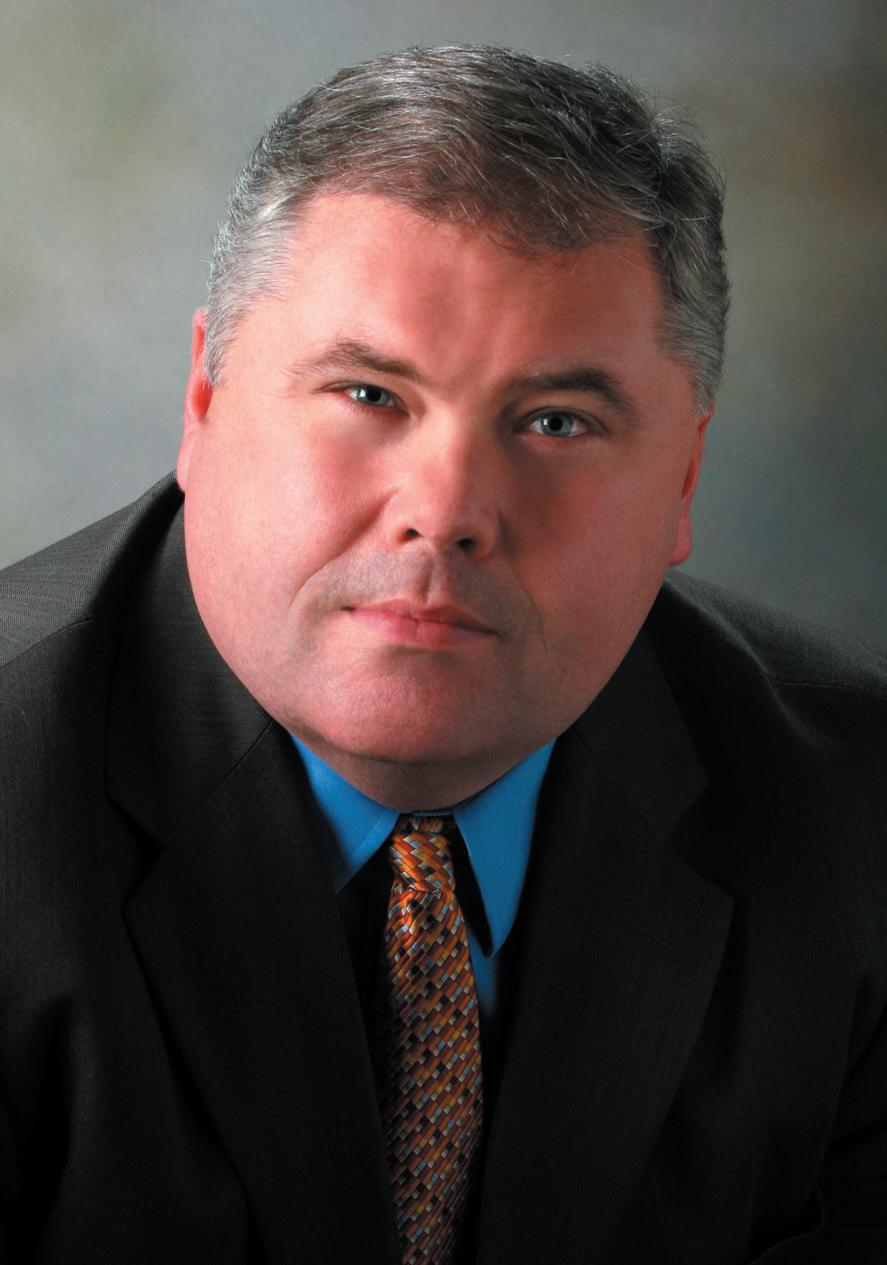
24 • community • mccneb.edu
New course offers education professionals additional credentials


The Workforce Innovation Division has introduced the CompTIA Certified Technical Trainer (CTT+) certification course, giving education and training professionals a chance to improve their resumé at a time when virtual learning is becoming more popular. The certification provides training standards to validate skills in a traditional or virtual classroom environment, ensuring students can speak to a class with confidence.
“Virtual classrooms have become essential during the pandemic to ensure a safe learning environment,” says Robert Caldwell, MCC workforce training manager and adjunct instructor. “But as education and training facilities begin to reopen their doors, some experts suspect that learner preferences have shifted and demand for virtual training will be much higher than before the pandemic.”
The certificate is an industry-accepted standard of excellence for teaching in a virtual or traditional classroom. It not only validates skills as an effective trainer, but it can also be an asset to career advancement. With this certification, education and training professionals can standout when seeking positions in their field.
Registration is now open. The course runs July 13-17. For more information, visit mcccorporateonline.com/courses/ctt.

12th annual Golf Outing to be held June 5
The MCC Foundation will host its 12th annual charity Golf Outing on Saturday, June 5 at Pacific Springs Golf Course. The proceeds from the event will benefit SkillsUSA students at MCC.

SkillsUSA provides educational programs, events and competitions that support career and technical education in the nation’s classrooms. MCC students have enjoyed great success at the state and national competitions, proving their expertise against others from secondary and postsecondary schools. Local health guidelines will be followed for this event.
To learn more about SkillsUSA, visit skillsusa.org.
community • mccneb.edu • 25




Metropolitan Community College
Box 3777
Stay informed. Connect with your community. issuu.com/mccneb @mccneb An accessible version of this publication can be found at mccneb.edu/AccessiblePublications.
P.O.
Omaha, NE 68103-0777








 Amy Recker Executive director, MCC Foundation
Amy Recker Executive director, MCC Foundation










































